-
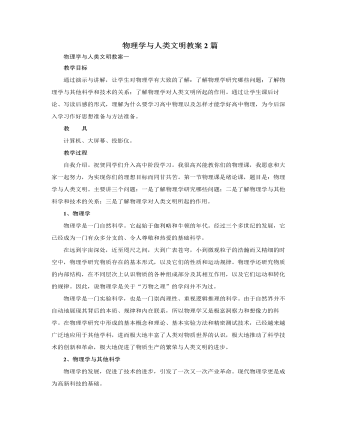
人教版新课标高中物理必修1物理学与人类文明教案2篇
1. 课前观看视频《物理学与人类文明》2. 分组讨论,派代表发言,谈学习感受。主要是物理的地位,物理的学习方法。3. 高中物理与初中物理在内容和方法上的区别高中物理除了现象、概念和规律之外还应该关注研究问题的方法,学会从先想到抽象,从定性到定量研究问题,学会用数学方法解决物理问题,学会实验探究,学会独立分析问题解决问题的思维习惯。4. 高中物理学习的基本要求高中物理学习应该“重视实验,勤于思考”和“经历过程,体验方法”。高中物理学习与初中物理学习虽然有一定区别,但也不是孤立的,要继续坚持初中物理学习中积累的学习方法和体会,重视从正反两个方面加以总结和提炼,做到:(1) 认真阅读,学会自学要学好物理,就要认真阅读课本。阅读课本是要抓住关键词语,弄清语句间的逻辑顺序和因果关系,领会文章段落所表达的物理内容,掌握课本叙述物理问题的表达方法。
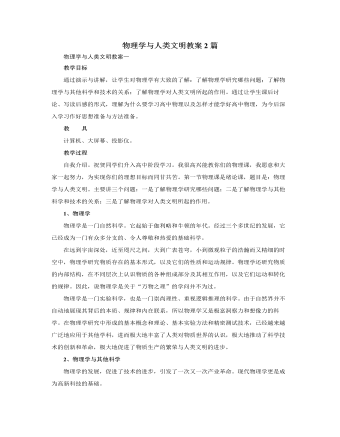
人教版新课标高中物理必修1物理学与人类文明教案2篇
八、物理学的基础地位及物理学对人类文明、社会进步的影响。(1) 情景一:磁悬浮实验:找两个空心的圆柱片磁铁,同名磁极相对,穿在同一根竹筷上,用手压下上面的磁铁,松手观察它的运动情况。问题1:上面的磁铁为什么会跳起来,为什么会悬浮在下面的磁铁上方?问题2:根据这个实验,你会想到那一种交通工具?总结:人们就是从磁悬浮现象中得到启发,进行磁悬浮列车的研究和制造的,这说明物理学在推动社会进步、人类文明方面起到推动作用。(2) 情景二:感应起电和火花放电实验:用感应起电机或感应圈产生火花放电,让学生观察现象,闻气味,然后联想生活实例。还可以用一张纸试着挡住放电的弧光,最好能引燃纸张,说明雷击引起火灾的现象。问题1:你看、听到了什么现象?问题2:根据这个实验,你会想到那一种自然现象?问题3:放电发生在什么地方?为什么建筑物上方都有尖尖的设置,是干什么用的?问题4:你闻到什么气味了吗?
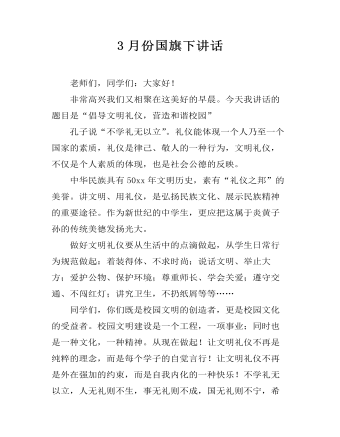
3月份国旗下讲话
老师们,同学们:大家好!非常高兴我们又相聚在这美好的早晨。今天我讲话的题目是“倡导文明礼仪,营造和谐校园”孔子说“不学礼无以立”。礼仪能体现一个人乃至一个国家的素质,礼仪是律己、敬人的一种行为,文明礼仪,不仅是个人素质的体现,也是社会公德的反映。中华民族具有50xx年文明历史,素有“礼仪之邦”的美誉。讲文明、用礼仪,是弘扬民族文化、展示民族精神的重要途径。作为新世纪的中学生,更应把这属于炎黄子孙的传统美德发扬光大。做好文明礼仪要从生活中的点滴做起,从学生日常行为规范做起:着装得体、不求时尚;说话文明、举止大方;爱护公物、保护环境;尊重师长、学会关爱;遵守交通、不闯红灯;讲究卫生,不扔纸屑等等……
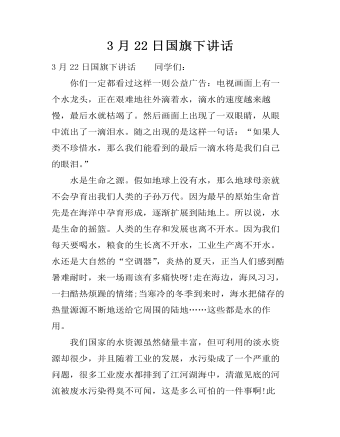
3月22日国旗下讲话
3月22日国旗下讲话 同学们:你们一定都看过这样一则公益广告:电视画面上有一个水龙头,正在艰难地往外滴着水,滴水的速度越来越慢,最后水就枯竭了。然后画面上出现了一双眼睛,从眼中流出了一滴泪水。随之出现的是这样一句话:“如果人类不珍惜水,那么我们能看到的最后一滴水将是我们自己的眼泪。”水是生命之源。假如地球上没有水,那么地球母亲就不会孕育出我们人类的子孙万代。因为最早的原始生命首先是在海洋中孕育形成,逐渐扩展到陆地上。所以说,水是生命的摇篮。人类的生存和发展也离不开水。因为我们每天要喝水,粮食的生长离不开水,工业生产离不开水。水还是大自然的“空调器”,炎热的夏天,正当人们感到酷暑难耐时,来一场雨该有多痛快呀!走在海边,海风习习,一扫酷热烦躁的情绪;当寒冷的冬季到来时,海水把储存的热量源源不断地送给它周围的陆地……这些都是水的作用。我们国家的水资源虽然储量丰富,但可利用的淡水资源却很少,并且随着工业的发展,水污染成了一个严重的问题,很多工业废水都排到了江河湖海中,清澈见底的河流被废水污染得臭不可闻,这是多么可怕的一件事啊!此外,浪费水的现象也十分严重,据统计,一个中等城市每年浪费的水相当于一个洞庭湖的水量!
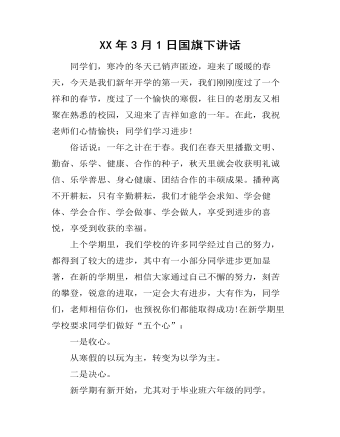
XX年3月1日国旗下讲话
同学们,寒冷的冬天已销声匿迹,迎来了暖暖的春天,今天是我们新年开学的第一天,我们刚刚度过了一个祥和的春节,度过了一个愉快的寒假,往日的老朋友又相聚在熟悉的校园,又迎来了吉祥如意的一年。在此,我祝老师们心情愉快;同学们学习进步!俗话说:一年之计在于春。我们在春天里播撒文明、勤奋、乐学、健康、合作的种子,秋天里就会收获明礼诚信、乐学善思、身心健康、团结合作的丰硕成果。播种离不开耕耘,只有辛勤耕耘,我们才能学会求知、学会健体、学会合作、学会做事、学会做人,享受到进步的喜悦,享受到收获的幸福。上个学期里,我们学校的许多同学经过自己的努力,都得到了较大的进步,其中有一小部分同学进步更加显著,在新的学期里,相信大家通过自己不懈的努力,刻苦的攀登,锐意的进取,一定会大有进步,大有作为
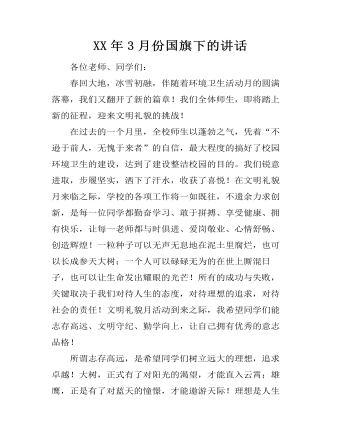
XX年3月份国旗下的讲话
各位老师、同学们:春回大地,冰雪初融,伴随着环境卫生活动月的圆满落幕,我们又翻开了新的篇章!我们全体师生,即将踏上新的征程,迎来文明礼貌的挑战!在过去的一个月里,全校师生以蓬勃之气,凭着“不逊于前人,无愧于来者”的自信,最大程度的搞好了校园环境卫生的建设,达到了建设整洁校园的目的。我们锐意进取,步履坚实,洒下了汗水,收获了喜悦!在文明礼貌月来临之际,学校的各项工作将一如既往,不遗余力求创新,是每一位同学都勤奋学习、敢于拼搏、享受健康、拥有快乐,让每一老师都与时俱进、爱岗敬业、心情舒畅、创造辉煌!一粒种子可以无声无息地在泥土里腐烂,也可以长成参天大树;一个人可以碌碌无为的在世上厮混日子,也可以让生命发出耀眼的光芒!所有的成功与失败,关键取决于我们对待人生的态度,对待理想的追求,对待社会的责任!文明礼貌月活动到来之际,我希望同学们能志存高远、文明守纪、勤学向上,让自己拥有优秀的意志品格!
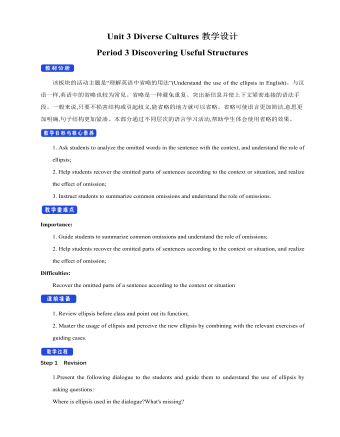
新人教版高中英语必修3Unit 3 Diverse Cultures教学设计三
The price is the same as(the price was)before the war.价格与战前相同。(4)定语从句中的“关系代词+助动词be”可以省略。The ticket(that/which was)booked by his sister has been sent to him.他妹妹订的那张票已送到了他那里。Step 5 PracticeActivity 3(1) Guide students to complete the four activities in the Using Structures part of exercise book, in which activities 1 and 2 focus on ellipsis in dialogue answers, activity 3 focus on signs and headlines, two typical situations where ellipsis is used, and activity 4 focus on ellipsis in diary, an informal style.(2) Combine the examples in the above activities, ask students to summarize the omitted situations in groups, and make their own summary into a poster, and post it on the class wall after class to share with the class.(This step should give full play to the subjectivity of students, and teachers should encourage students to conclude different ellipsis phenomena according to their own understanding, they can conclude according to the different parts omitted in the sentence.)Step 6 Homework1. Understand and master the usages of ellipsis;2. Finish the other exercises in Using structures of Workbook.1、通过本节内容学习,学生是否理解和掌握省略的用法;2、通过本节内容学习,学生能否根据上下文语境或情景恢复句子中省略的成分,体会使用省略的效果;3、通过本节内容学习,学生能否独立完成练习册和导学案中的相关练习。

新人教版高中英语必修3Unit 3 Diverse Cultures教学设计二
(2)Consolidate key vocabulary.Ask the students to complete the exercises of activity 6 by themselves. Then ask them to check the answers with their partners.(The first language:Damage of the 1906 San Francisco earthquake and fire.A second language: Yunnan - one of the most diverse provinces in China).Step 5 Language points1. The teacher asks the students to read the text carefully, find out the more words and long and difficult sentences in the text and draw lines, understand the use of vocabulary, and analyze the structure of long and difficult sentences.2. The teacher explains and summarizes the usage of core vocabulary and asks the students to take notes.3. The teacher analyzes and explains the long and difficult sentences that the students don't understand, so that the students can understand them better.Step 6 Homework1. Read the text again, in-depth understanding of the text;2. Master the use of core vocabulary and understand the long and difficult sentences.3. Complete relevant exercises in the guide plan.1、通过本节内容学习,学生是否理解和掌握阅读文本中的新词汇的意义与用法;2、通过本节内容学习,学生能否结合文本特点了解文章的结构和作者的写作逻辑;3、通过本节内容学习,学生能否了解旧金山的城市风貌、文化特色,以及加利福尼亚州的历史,体会多元文化对美国的影响。
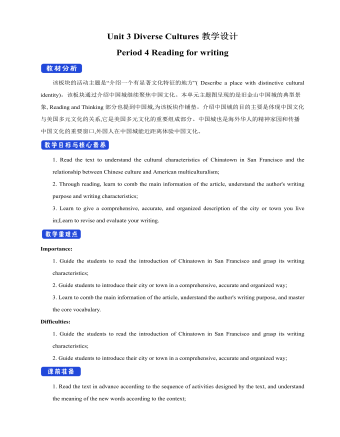
新人教版高中英语必修3Unit 3 Diverse Cultures教学设计四
该板块的活动主题是“介绍一个有显著文化特征的地方”( Describe a place with distinctive cultural identity)。该板块通过介绍中国城继续聚焦中国文化。本单元主题图呈现的是旧金山中国城的典型景象, Reading and Thinking部分也提到中国城,为该板块作铺垫。介绍中国城的目的主要是体现中国文化与美国多元文化的关系,它是美国多元文化的重要组成部分。中国城也是海外华人的精神家园和传播中国文化的重要窗口,外国人在中国城能近距离体验中国文化。1. Read the text to understand the cultural characteristics of Chinatown in San Francisco and the relationship between Chinese culture and American multiculturalism;2. Through reading, learn to comb the main information of the article, understand the author's writing purpose and writing characteristics;3. Learn to give a comprehensive, accurate, and organized description of the city or town you live in;Learn to revise and evaluate your writing.Importance:1. Guide the students to read the introduction of Chinatown in San Francisco and grasp its writing characteristics;2. Guide students to introduce their city or town in a comprehensive, accurate and organized way;3. Learn to comb the main information of the article, understand the author's writing purpose, and master the core vocabulary.

新人教版高中英语必修3Unit 3 Diverse Cultures教学设计一
Activity 81.Grasp the main idea of the listening.Listen to the tape and answer the following questions:Who are the two speakers in the listening? What is their relationship?What is the main idea of the first part of the listening? How about the second part?2.Complete the passage.Ask the students to quickly review the summaries of the two listening materials in activity 2. Then play the recording for the second time.Ask them to complete the passage and fill in the blanks.3.Play the recording again and ask the students to use the structure diagram to comb the information structure in the listening.(While listening, take notes. Capture key information quickly and accurately.)Step 8 Talking Activity 91.Focus on the listening text.Listen to the students and listen to the tape. Let them understand the attitudes of Wu Yue and Justin in the conversation.How does Wu Yue feel about Chinese minority cultures?What does Justin think of the Miao and Dong cultures?How do you know that?2.learn functional items that express concerns.Ask students to focus on the expressions listed in activity. 3.And try to analyze the meaning they convey, including praise (Super!).Agree (Exactly!)"(You're kidding.!)Tell me more about it. Tell me more about it.For example, "Yeah Sure." "Definitely!" "Certainly!" "No kidding!" "No wonder!" and so on.4.Ask the students to have conversations in small groups, acting as Jsim and his friends.Justin shares his travels in Guizhou with friends and his thoughts;Justin's friends should give appropriate feedback, express their interest in relevant information, and ask for information when necessary.In order to enrich the dialogue, teachers can expand and supplement the introduction of Miao, dong, Lusheng and Dong Dage.After the group practice, the teacher can choose several groups of students to show, and let the rest of the students listen carefully, after listening to the best performance of the group, and give at least two reasons.
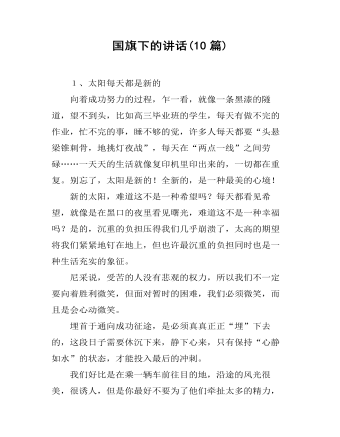
国旗下的讲话(10篇)
1、太阳每天都是新的向着成功努力的过程,乍一看,就像一条黑漆的隧道,望不到头,比如高三毕业班的学生,每天有做不完的作业,忙不完的事,睡不够的觉,许多人每天都要“头悬梁锥刺骨,地挑灯夜战”,每天在“两点一线”之间劳碌……一天天的生活就像复印机里印出来的,一切都在重复。别忘了,太阳是新的!全新的,是一种最美的心境!新的太阳,难道这不是一种希望吗?每天都看见希望,就像是在黑口的夜里看见曙光,难道这不是一种幸福吗?是的,沉重的负担压得我们几乎崩溃了,太高的期望将我们紧紧地钉在地上,但也许最沉重的负担同时也是一种生活充实的象征。尼采说,受苦的人没有悲观的权力,所以我们不一定要向着胜利微笑,但面对暂时的困难,我们必须微笑,而且是会心动微笑。埋首于通向成功征途,是必须真真正正“埋”下去的,这段日子需要休沉下来,静下心来,只有保持“心静如水”的状态,才能投入最后的冲刺。我们好比是在乘一辆车前往目的地,沿途的风光很美,很诱人,但是你最好不要为了他们牵扯太多的精力, 而要使目光一直朝着终点的方向看,如果忍不住跳下车去欣赏暂时的美景,这辆车就开走了,也许你会看到另一辆车,也许最后你同样到达目的地,但那也不是你人生准点的时刻了。

人教版新目标初中英语七年级下册How was your weekend教案2篇
Teaching Goal:1. General aims:Talk about recent past events2. Particular aims:A. Language Focus.Talk about recent past events and think of the past events.B. Language goalsHow was….?It was …What did …do over the weekend?C. Language structures:(1). How was your weekend? I was great. Pay attention to no form.(2). What did you do over the weekend? I played soccer. We went to the beach.D. Useful words and phrases:Words: was, did, went, beach, over, project, test, wasn’t, false, number, geography, spend, week, most, mixture, their, had, little, cook, read, saw, change, everyone, sit, sat, no, anythingPhrases: did one’s homework, played soccer, cleaned my room, went to the beach, played tennis, went to the movies, on Saturday morning, over the weekend, cook … for, what about, do some reading, have a party, talk show, go shoppingE. Grammar language:Present simple past tenseRegular and irregular verbsF. Learning strategies:Tour and holidaysG. Interdiscipinary:H. Emotion and manner:Teaching time: 5 periodsTeaching procedures:Period One教学步骤、时间 教师活动 学生活动 媒体应用Step 1Free talk 3’ Ask some questions like:Who’s on duty today?What’s the weather like? Answer and talk about something.让同学们回答下列问题1. Do you like weekend? (Let some students answer)It takes them three minutes to talk about the question.2. Why do you like weekend? (let the students answer) Most of the students like the weekend此时教师用汉语问:“在周末期间问你干了什么?这句话用英语这么回答?Let the students guess.At last the teacher give them right answer3. What did you do over the weekend?(板书、学习)

人教版新目标初中英语七年级下册Where is the post office教案2篇
Period 2 (3a----Section B 2c)Preview(Pre-task): Key points: What laAdd another information about their pen pals----their language on the cardnguage does she/he speak?She/He speaks....Does she/he have any brothers and sisters? Does she/he speak English?Preview(Pre-task): Add another information about their pen pals----their language on the cardKey points: What language does she/he speak?She/He speaks....Does she/he have any brothers and sisters? Does she/he speak English?Step 1 Revision1.Revisionand dictation of the new words 2.Revise the drills they learned yesterday.(by pairwork and grammar exercise)Step 2 Leading-inT has a conversation with one student. The conversation is following:---Do you have a pen pal?---Yes, I do.---What's your pen pal's name? ---His/Her name is....---Where is your pen pal from? ---He/She is from...---Where does he/she live? ---He/She lives in....---What language does he/she speak?He/She speaks...Write the new words on the Bb. They are following: EnglishChineseJapaneseFrenchStep 3 LearnLearn the new words with the whole class.Finish 3a with the students3b Pairwork T still does an example with one student Then the Ss practise in pairs. The example is following:--Curry Muray is my pen pal. He is from the United States.---What language does he speak?
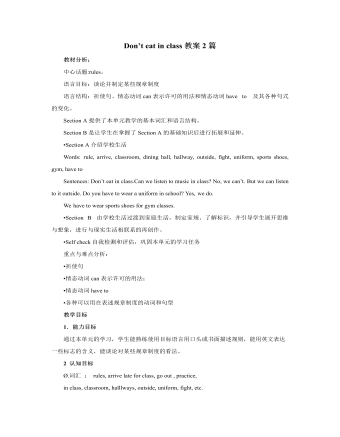
人教版新目标初中英语七年级下册Don’t eat in class教案2篇
Don’t fight. =You can’t fight. (板书,教读)教师把这些句子板书在黑板上,并请学生大声整齐地读祈使句和“can’t”句型,并让学生注意两种句型表达形式的不同和转换,“Don’t …=You can’t…”;并对学生说:These are our school rules. (板书,教读) You can’t break the school rules. Don’t break the school rules.(板书,教读)步骤3 :Practicea. T: Now, each of the students is breaking one of these rules.Please finish 1a.学生看图,完成1a的内容,检查答案并大声朗读校规。b. 听录音,完成1b,选出四位学生都违反了哪条校规;听之前,学生要读会英文名。c. 请两位学生朗读1c部分的句型;要求学生两人一组对话表演,SA扮演外校转来新生,SB告知本校校规。(学生可经过讨论,多说出他们想到的校规,不必只限于书上;教师应给予帮助)2) 第二课时(2a~4)步骤1 :warming up of revisionT: What are the rules at your school?学生使用“can”或祈使句表达各条校规;其中老师可引出“eat in the cafeteria outside”的表达。步骤2 :Practicea.T: Christina is an exchange student. She doesn’t know the rules. Let’s listen, what activities they’re talking about?学生听第一遍时,完成2a;第二遍时,完成2b;b. 请学生领读2c部分,看着2a完成的表格,理解2c活动的要求;分成小组针对2a进行问答;
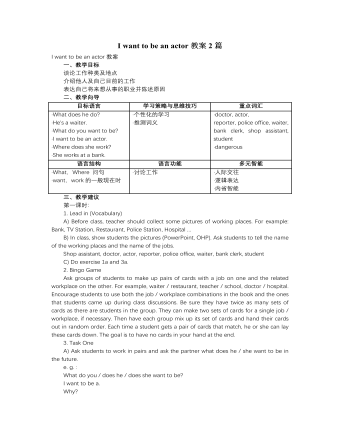
人教版新目标初中英语七年级下册I want to be an actor教案2篇
三、教学建议第一课时:1. Lead in (Vocabulary)A) Before class, teacher should collect some pictures of working places. For example: Bank, TV Station, Restaurant, Police Station, Hospital ...B) In class, show students the pictures (PowerPoint, OHP). Ask students to tell the name of the working places and the name of the jobs.Shop assistant, doctor, actor, reporter, police office, waiter, bank clerk, studentC) Do exercise 1a and 3a.2. Bingo GameAsk groups of students to make up pairs of cards with a job on one and the related workplace on the other. For example, waiter / restaurant, teacher / school, doctor / hospital. Encourage students to use both the job / workplace combinations in the book and the ones that students came up during class discussions. Be sure they have twice as many sets of cards as there are students in the group. They can make two sets of cards for a single job / workplace, if necessary. Then have each group mix up its set of cards and hand their cards out in random order. Each time a student gets a pair of cards that match, he or she can lay these cards down. The goal is to have no cards in your hand at the end.3. Task OneA) Ask students to work in pairs and ask the partner what does he / she want to be in the future.e. g. :What do you / does he / does she want to be?I want to be a.Why?Because it's (adj).B) Vocabulary: Section B, 1a4. Homework 1.2.
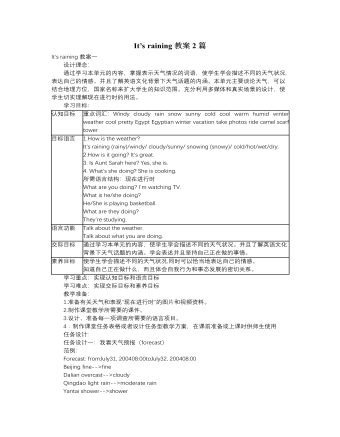
人教版新目标初中英语七年级下册It’s raining教案2篇
1 Each group choose one place to describe and what you are doing in it Choose one place, and describe what they are doing 2 Move around the room and give suggestions Talk about it and write it down 3 Ask one to show their works and act it Choose one of each group to make a report 4 Evaluate the best group and the best reporter Choose the best one Homework Ask your friends their ideal place and write about it教学反思:新课程标准中强调学生在课堂中的主体地位,在综合课中他们的主体地位就更加突出。在各个活动中给不同程度的学生不同层次的任务,让各层面的学生都有表现发挥的机会,从而产生对英语的兴趣。使用照片图片多媒体来辅助教学,效果更好。同时让了解其他国家风景,风俗的同学介绍ideal place,增加学生的背景知知识,实现跨学科交流的目的。教案点评:采用任务型教学模式,在各个活动中给不同程度的学生不同层次的任务,让各层面的学生都有表现发挥的机会,从而产生对英语的兴趣。使用照片图片多媒体来辅助教学,效果更好。让了解其他国家风景,风俗的同学介绍ideal place,增加学生的背景知识,实现跨学科交流的目的。
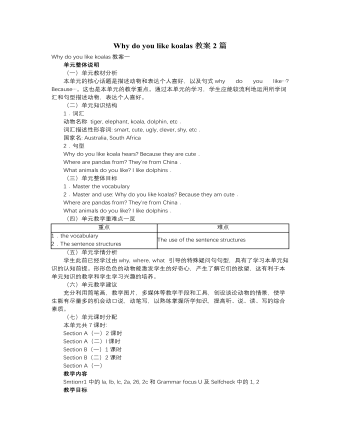
人教版新目标初中英语七年级下册Why do you like koalas教案2篇
单元整体说明(一)单元教材分析本单元的核心话题是描述动物和表达个人喜好,以及句式why do you like…? Because…。这也是本单元的教学重点。通过本单元的学习,学生应能较流利地运用所学词汇和句型描述动物,表达个人喜好。(二)单元知识结构1.词汇动物名称 tiger, elephant, koala, dolphin, etc.词汇描述性形容词: smart, cute, ugly, clever, shy, etc.国家名: Australia, South Africa2.句型Why do you like koala hears? Because they are cute.Where are pandas from? They're from China.What animals do you like? I like dolphins.(三)单元整体目标1.Master the vocabulary2.Master and use: Why do you like koalas? Because they am cute.Where are pandas from? They're from China.What animals do you like? I like dolphins.(四)单元教学重难点一览(五)单元学情分析学生此前已经学过由why, where, what 引导的特殊疑问句句型,具有了学习本单元知识的认知前提。形形色色的动物能激发学生的好奇心,产生了解它们的欲望,这有利于本单元知识的教学和学生学习兴趣的培养。
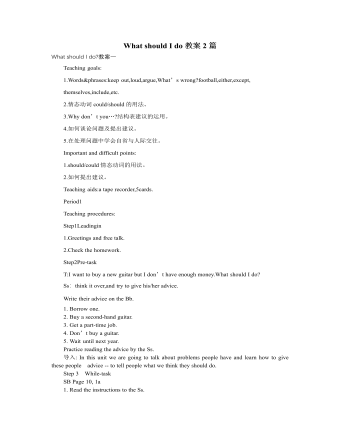
人教版新目标初中英语八年级下册What should I do教案2篇
说明:在帮Li Lei提建议的同时,教育学生如何学好英语。第三课时教学目标1. 语言目标:a) 词汇: Original, in style, haircut, the same as.b) 语言结构:My friend wears the same clothes and has the same haircut as I do.2. 能力目标:大多数学生能够谈论自己喜欢哪种服装,提高查找信息的能力。3. 情感目标:学会如何与朋友相处,要有自己对时尚的看法。教学重点掌握一些重要词汇。教学难点学会谈论问题,并能提出书面建议。◆教学突破首先针对Erin的问题,提出个人的建议,模仿2c部分的对话展开双人交际Pair-work;听老师诵读3a部分的信件,并找出LEFT OUT的问题所在;学生完成3b部分的内容,给Left Out提出书面的建议;学以口头形式提出自己目前存在的某个问题,讲给大家听,让同学们给自己提出一个建议,并作笔录;学生两、三个人分成一组,随意性地进行口语交际,谈论P14的第4部分的某个问题,相互交换意见。
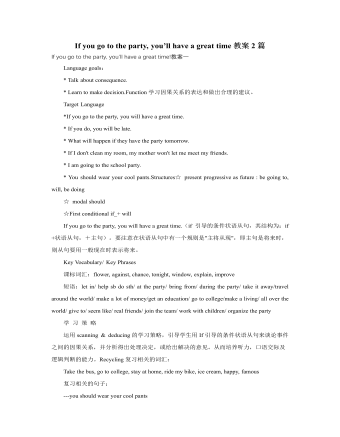
人教版新目标初中英语八年级下册If you go to the party, you’ll have a great time教案2篇
区分宾语从句、定于从句和状语从句宾语从句和状语从句,都叫做主从复合句。宾语从句主要是中考必考的,是初中阶段必掌握的从句,宾语从句主要是掌握三要素,所谓宾语从句,就是宾语在主从复合句当中充当宾语的一个句子,叫做宾语从句。主句的谓语动词是及物动词,后面如果是词或者是短语的话,是简单句,如果是句子的话,肯定是宾语从句。I know that he good at English.就是宾语从句,三要素,一要素是要注意连词,连词一共学了三类连词,一类连词是that口语当中可以省略,就像刚才说的那一句,I hear he is good at English.还有疑问代词、疑问副词,how where when,疑问代词、疑问副词。还有一类连词weather是否的意思,不是状语从句当中的如果,这一定要和如果区分开,这是是否。I don't know if he interested at English。宾语从句要注意if是连词。第二要素是语序,要用陈述举语序。比如说你家有几口人,我们都说How many people are there in you family?但是这是简单句,一旦说成宾语从句,你可以告诉我你家有几口人吗?Could you tell me how many people there are in you family ?

人教版新目标初中英语八年级下册It’s a nice day, isn’t it教案2篇
"Hello! Welcome to English class! Introduce yourself. Meet your new classmates." That's what the teacher says. What do you say? "Oh no!" It can be difficult talking to new people. But it can be fun, and you can make friends. How do you do it? Make small talk. Small talk is polite conversation. "Wang Nan is a great pingpang player, isn't she?" "I'd love to meet her, wouldn't you?" "It's been raining a lot, hasn't it?" Tag questions are a form of polite speech. To make small talk successfully, you should know how to make them. You should also know what topics to talk about. Try to learn this unit carefully. The next time you're in English class, you'll find out. Making small talk's easy, isn't it? (“你好!欢迎你!请做一下自我介绍。认识一下你的新同学。”通常在课上老师会这样说。你会说什么呢?“噢,不!”与陌生人谈话太困难了。但是这也很有意思,并且你还能交到朋友。你该怎么做呢?闲聊。闲聊指得是礼貌的对话。“王楠是一个很棒的乒乓球运动员,不是吗?”“我希望自己能认识她,你呢?“今年的雨水很多,不是吗?”反意疑问句是一种礼貌用语。为了使得谈话成功,你应该知道怎样去进行闲聊。你还应该知道与不同的人该谈论什么样的话题。认真的学习这个单元吧,下次在英语课上,你会发现与大家展开谈话是一件很容易的事情,不信我们来试试。)

